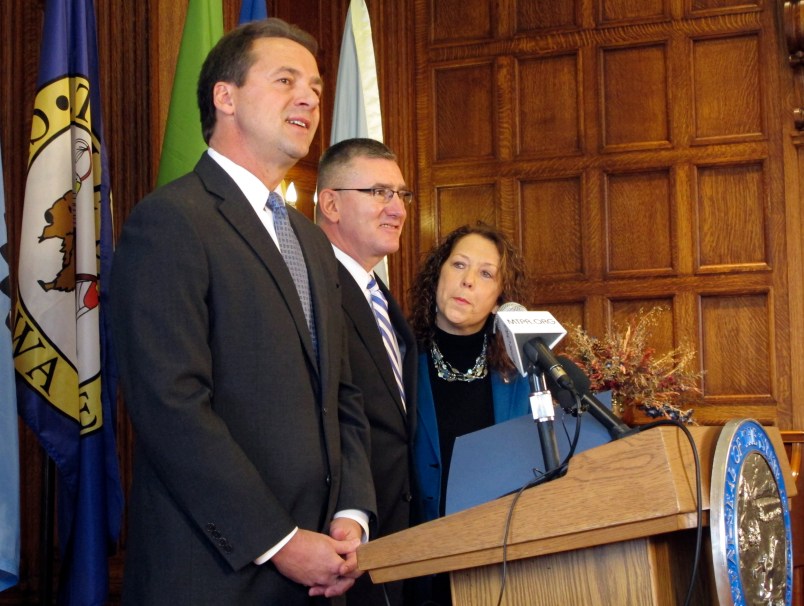HELENA, Mont. (AP) — Max Baucus’ decision not to seek re-election to the Senate after 35 years opened the door for Republicans to pick up one of the six Democratic seats they need to recapture control of the Senate. But his early resignation after being named U.S. ambassador to China may have bolstered Democratic prospects of retaining the seat they’ve held for a century, thanks to the value of incumbency.
Baucus’ China appointment by President Barack Obama allowed Montana Gov. Steve Bullock, a Democrat, to name his lieutenant governor, John Walsh, to fill the suddenly vacant Senate seat until January. That makes the little known state adjutant general the odds on favorite to win the Democratic primary in June and mount a general election challenge of likely GOP nominee Steve Daines, a freshman congressman who won his statewide congressional seat by wide margin in 2012.
In the June 3 primary, Walsh faces former Lt. Gov. John Bohlinger, who switched parties to run for the Senate, and rancher Dirk Adams, who is making his first run for office. Both have taken issue with the advantage Bullock gave Walsh by appointing him to Baucus’ seat. They were further dismayed when the Montana Democratic Party endorsed Walsh before the primary.
“Something’s rotten within the Montana Democratic Party,” said Bohlinger. “They broke a longstanding tradition of not getting involved in primaries.”
Daines has a big fundraising and name recognition edge in the GOP primary against state Rep. Champ Edmunds and political newcomer Susan Cundiff, an administrative assistant at the University of Montana.
Republicans have a built-in advantage in Montana, where voters are skittish about the still-recovering economy and Democrats are running into headwinds from an unpopular president and his even more unpopular health care law. Obama lost Montana in 2012 by nearly 14 percentage points, but voters still re-elected Democratic Sen. Jon Tester and put Bullock in office in that same election.
And Walsh, now a member of the Senate, can no longer run as an outsider. By the fall, he will have a record of nearly a year of votes to defend.
Before his appointment, Walsh had been an unknown commodity in Montana politics. He spent 33 years in the Montana National Guard before Bullock picked him as a running mate. His name recognition was relatively low and his political track record nil.
And early in the campaign, Walsh came under fire amid reports that he was reprimanded by the U.S. Army in 2010 for using his position as adjutant general to pressure troops to join the National Guard Association of the United States. Walsh was running for a leadership position in the private association at the time. He denied any wrongdoing and released about 400 pages of his military records in response to the reprimand
“My entire adult life has been in public service,” Walsh said in a recent interview. “I went about this in the same way I decided whether or not to run for lieutenant governor: Can I serve the citizens of Montana better as lieutenant governor or as adjutant general? Can I serve the people better as lieutenant governor or U.S. senator?”
Now, Walsh is on a more equal footing with Daines as they wage a campaign from meet-and-greets in Big Sky Country cafes to floor speeches under the Capitol dome. The Democrat’s new Senate press operation is cranking out releases on bills he is backing to build his record and to get his name out to voters.
For his part, Daines wants to help Republicans retake the Senate majority and replace Nevada Sen. Harry Reid as majority leader.
“I think most people were pleased when Nancy Pelosi was no longer in charge of the House,” Daines said. “I think they want to see a job description change for Harry Reid, as well.”
The money is rolling in for both candidates. Walsh reported a nearly 62 percent increase in contributions for the first three months of the year compared to the quarter before his appointment. But the $946,000 he raised fell short of the $1.2 million Daines took in during the same period — and the Republican has $2.2 million to spend, while Walsh has about $700,000 in the bank.
Walsh has been alternately touting his military background and cutting down Daines as he tries to woo voters. Walsh reminds audiences that he’s the only Iraq war veteran in the Senate and accuses Daines of adhering to a “cruel and cowardly” tea-party ideology that led him to vote to shut down the federal government last year.
“I think when Montanans have the ability to contrast the two candidates, they’re going to realize that he is not the right choice for Montana,” Walsh said of Daines.
Daines said he is no tea-party ideologue, but a pragmatic leader applying his “more jobs, less government” philosophy.
“In some votes you get hit from the left, in some votes you get hit by the right,” he said. “When I push the button on the House floor to vote, I think, ‘What do the million Montanans that I represent want?'”
Montana State University political scientist David Parker said Daines’ voting record during his first year in Congress ranks him as the most conservative representative Montana has sent to the House since World War II.
Daines’ conservatism is in line with the direction the national Republican Party has moved, Parker said, but Montana voters are independent-minded and say they are Republican while displaying distinctly progressive traits, from a distrust of big companies and concentrations of wealth to wanting to keep Social Security intact.
Parker questions whether Walsh has enough time to make his case in a state that appears to have become more conservative since re-electing Democratic Sen. Jon Tester in 2012.
“Walsh as an incumbent is not as secure,” Parker said. “Given the environment, I think the odds do favor Daines.”
Copyright 2014 The Associated Press. All rights reserved. This material may not be published, broadcast, rewritten or redistributed.






